Question
Anderson v. Griswold 2023CO 63 No. 23SA300 found atwww.courts.state.co.us This the Colorado case. TRUMP v ANDERSON is the name at the U.S. Supreme Court where
Anderson v. Griswold 2023CO 63 No. 23SA300 found atwww.courts.state.co.usThis the Colorado case. TRUMP v ANDERSON is the name at the U.S. Supreme Court where it was argued last week. You want the Colorado case for your paper but may want to listen to the oral argument at Supreme Court.
For this paper, I am NOT asking you to figure out how I would rule if I were on the Court. I am NOT asking you to guess how the Court will rule (albeit you are free to make that guess if it something the supports your paper or you feel needs to be refuted.) I am NOT asking you to make it a legal brief with correct format and citation.
I AM asking to:
- Identify the issue(s) in the case. Why they are/are not important.
- Critique the Colorado Supreme Court decision using the various lessons of this class, including:
- How is this case an example of the tension between being a Democracy and a Republic?
- What method(s) of interpretation listed in your text plus originalism are used by the Court/parties and how convincing are they? (ft.1)
- Whether voting is/is not a fundamental right and how that affects the case determination.
- Any other aspects of the case you think relevant (i.e., federalism, ways for the Court to not decide the Constitutional issues, fear of reaction to the decision, reputation of the Court and how it might affect its decision, others).
- State whether you would affirm (in part or in whole) or overturn (in part or in whole) the Colorado Supreme Court's decision. Justify your choice based on your analysis of the Colorado Supreme Court's decision.
Please use an editing program and proofread the paper.
Works Cited & Citations - You are expected to cite any sources that you use, including legal precedents and/or arguments and opinions on prior cases (majority, concurring, or dissenting). Whatever citation format you use is acceptable, as long as your format is legible and consistent. Note that strictly speaking, this is not a research paper - you are free to do outside research, but you are not expected to submit a multi-page bibliography. If your Works Cited page lists fewer than 10 sources, that need not be any impediment to your ability to complete the assignment.
Suggestions - The best way to think about your term paper is to reflect on the overall course. Your text is divided into three parts:
- The first section introduces you to basic concepts designed to equip you with analytical tools in reading the Constitution, breaking it down to its components and understanding methods of interpretation. It does so in a modified approach of traditional case law, where your author highlights the importance of the issue(s) the case illustrates. I have given you supplemental materials to augment those sections. I encourage you to review those.
- The second section delves dipper into the structural limits of power. It expands the concept of "enumerated "(Federal) v. "unenumerated" (State) powers and how these competing powers are resolved utilizing Supremacy and Federalism, as well as the competing structures of power under "Separation of Powers." I only cover this in my lectures and the author's videos. You may choose to reference (or selectively read) these sections as you deem appropriate to your term paper having identified the issues.
- In section three a whole chapter ("Equality Rights") is spent on levels of scrutiny. I skip this as my "Tools of the Trade" handout on this subject is hopefully all you need. The chapters on "Fairness Rights" (read "Procedural Due Process") and "Freedom Rights" (read "Substantive Due Process") finally get to some of our "Fundamental Rights." I augment both these concepts in the "Warren Court" class and in additional lectures not sourced from the text. You may or may not find this relevant to your paper.
No single case is going to cover every issue we are studying. However, I think the case I have chosen illustrates many of those issues. Most importantly, it is a powerful example of how historically fundamental issues are relevant to our society today. Whether one goes to law school or not, every citizen should be able to comprehend the significance of this moment in history and I hope this course and the work you do on your term paper equips you to engage in this civic duty. A democratic republic must have an informed electorate.
*Ft.1. I listened to the oral argument at the Supreme Court. I have opinions on how I think the Court will rule, but I will refrain from expressing them lest I prejudice your thinking. I will note that the methods of interpretation, the concepts of pre-emption, federalism, fundamental rights (First Amendment), standard of review (see handout) among others were addressed. I was also struck by the issues the Court raised concerning "Due Process" and the chaos of fifty states making different decisions, issues largely abandoned by the petitioners. Lastly, the "softball" questions revealed much of the variou
Step by Step Solution
There are 3 Steps involved in it
Step: 1

Get Instant Access to Expert-Tailored Solutions
See step-by-step solutions with expert insights and AI powered tools for academic success
Step: 2

Step: 3

Ace Your Homework with AI
Get the answers you need in no time with our AI-driven, step-by-step assistance
Get Started


